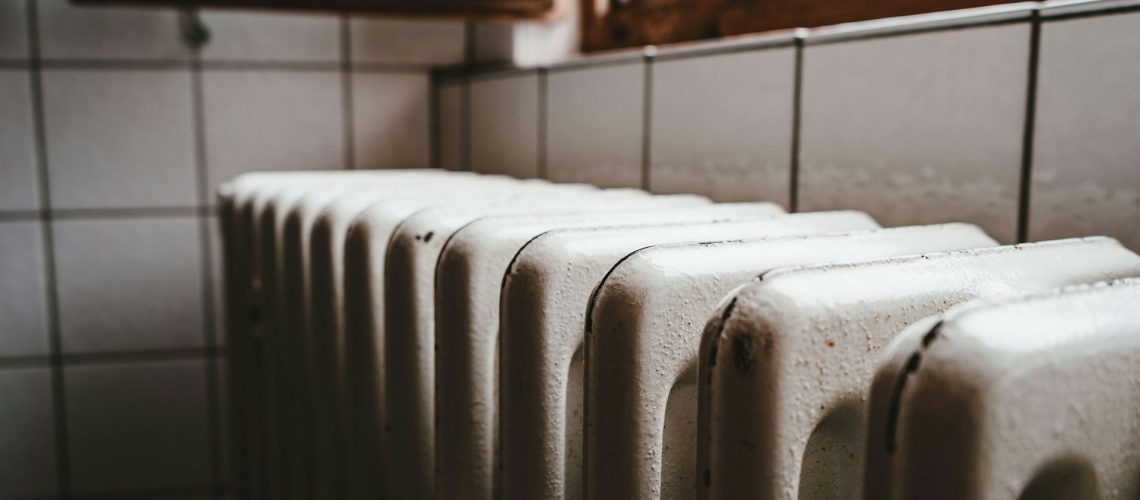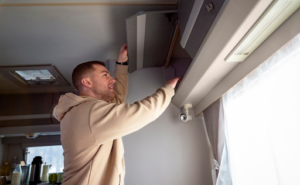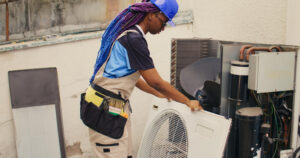Menu

Efficient Home Heating Solutions for Comfort & Eco-Friendliness | Bromac
Every homeowner in the Lower Mainland and Fraser Valley knows that an efficient and reliable heating system is crucial for maintaining a comfortable home, especially during our chilly Canadian winters. But, with continuously rising energy costs and growing concerns about the impact of residential heating on the environment, it is also essential for your home heating solutions to support eco-friendliness and energy efficiency. As a trusted plumbing and heating company in Abbotsford, Bromac is here to help homeowners explore various heating system options and make informed decisions that cater to their unique needs while prioritizing comfort and sustainability.
In our blog series focused on efficient home heating solutions, we will provide comprehensive insights into a range of heating systems, technologies, and best practices. From understanding the workings of furnaces, boilers, and heat pumps to examining the benefits of smart thermostats, radiant floor heating, and ductless mini-split systems, our extensive knowledge will aid you in making the right choice for your home’s heating requirements.
As heating systems greatly impact energy consumption and carbon footprint, it is vital to explore ways to reduce environmental impact while still maintaining the desired level of comfort. Whether you are looking to upgrade your existing heating system, improve your home’s insulation, or choose the best heating system fuel type for your needs, our blog series will equip you with the information and guidance you need to make the optimal choice for your home, your wallet, and the environment.
Join us as we delve into the world of efficient home heating solutions with Bromac’s expert advice and services. Together, let’s create a cozy, comfortable, and eco-friendly home for you and your family to enjoy for years to come.
Types of Efficient Home Heating Systems: Furnaces, Boilers, Heat Pumps, and More
There are various types of home heating systems available, each with unique benefits and features that cater to different homeowner needs. Familiarizing yourself with these options will empower you to make a well-informed decision for your home.
1. Furnaces: Furnaces are a common choice for home heating, providing warm air by igniting fuel (natural gas, propane, or oil) and circulating the heated air throughout the house using ducts. High-efficiency furnaces can achieve an Annual Fuel Utilization Efficiency (AFUE) rating of up to 98%, meaning the majority of fuel consumed is converted into heat for your home.
2. Boilers: Boilers use heated water instead of air for warmth, distributing the heat through radiant systems like radiators, underfloor heating, or baseboard heating. Regardless of whether they use natural gas, propane, oil, or electricity, efficient boilers can offer considerable savings on your energy bills while delivering comfortable, even heat.
3. Heat Pumps: Heat pumps are an energy-efficient alternative to furnaces and boilers, as they transfer heat from the surrounding air or ground rather than producing it. They can serve as both heating and cooling systems and are powered by electricity, making them an eco-friendly option. Geothermal heat pumps and air-source heat pumps boast efficiency ratings such as the Heating Season Performance Factor (HSPF) and Coefficient of Performance (COP).
Understanding High-Efficiency Heating System Ratings: AFUE, HSPF, and COP
Energy efficiency ratings help you compare different heating systems and determine potential energy savings. Here’s a brief overview of some common rating systems:
1. AFUE (Annual Fuel Utilization Efficiency): AFUE measures the efficiency of furnaces and boilers, expressing the percentage of fuel converted into usable heat. A higher AFUE rating indicates a more efficient system. For example, a furnace with a 98% AFUE rating converts 98% of consumed fuel into heat, wasting only 2%.
2. HSPF (Heating Season Performance Factor): HSPF measures the efficiency of air-source heat pumps, providing an average ratio of the heating output to the energy input over a heating season. A higher HSPF rating means a more efficient heat pump. Heat pumps with HSPF ratings between 8 and 10 are considered highly efficient.
3. COP (Coefficient of Performance): COP measures how efficiently geothermal heat pumps transfer heat. A geothermal heat pump with a higher COP can provide more heat using the same amount of energy, translating into greater efficiency and savings.
Benefits of Smart Thermostats for Energy Savings and Improved Comfort
Investing in a smart thermostat can improve your home’s efficiency while offering you greater control and customization. Smart thermostats can:
1. Learn your heating preferences and adapt accordingly, delivering consistent comfort and energy savings.
2. Allow remote control, enabling you to adjust your home’s temperature from anywhere using your smartphone or other connected devices.
3. Provide energy usage reports for better understanding and optimization of your heating system performance.
4. Integrate with other smart home devices for a seamless user experience.
Best Practices for Maintaining Your Heating System to Maximize Efficiency
Proper maintenance is crucial for the optimal performance, energy efficiency, and longevity of your home heating system. Here are some maintenance tips:
1. Regularly inspect and clean your heating system: Removing dust and debris reduces strain on your system, ensuring it runs efficiently and prolongs its lifespan.
2. Schedule annual professional maintenance: As a homeowner, there are limits to the maintenance you can perform. Professional technicians can offer additional services such as tuning, testing, and part replacements, keeping your heating system in top condition.
3. Change filters frequently: Dirty filters restrict airflow and force your heating system to work harder, which can decrease energy efficiency and increase the risk of potential problems. Replace filters every 1 to 3 months, depending on your system, to ensure efficient operation.
4. Inspect and seal ducts: Leaky ducts can result in significant heat loss and increased energy bills. Regularly inspect your ductwork and seal any leaks with mastic sealant for improved energy efficiency.
Conclusion
Navigating the world of efficient home heating solutions can be challenging, but understanding various heating systems, their efficiency ratings, and maintenance best practices can help you make an informed decision that caters to your needs, promotes comfort, and reduces environmental impact.
At Bromac, we are dedicated to providing top-notch plumbing and heating services to the Lower Mainland and Fraser Valley while offering comprehensive advice and insights to help you live comfortably and sustainably. Together, let’s create a comfortable, eco-friendly home where you and your loved ones can thrive throughout the chilly Canadian winters and beyond. Contact us for your boiler, furnace, and water heater repair and installation needs!


